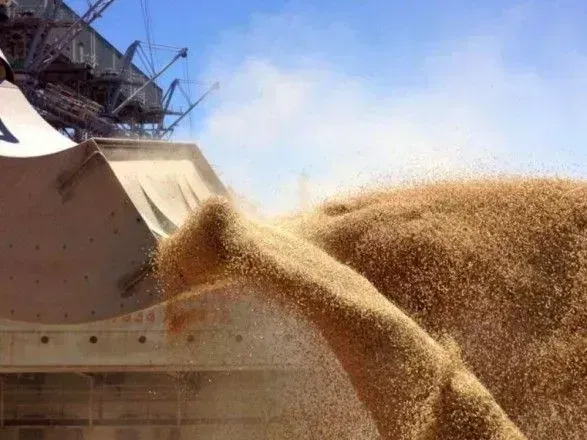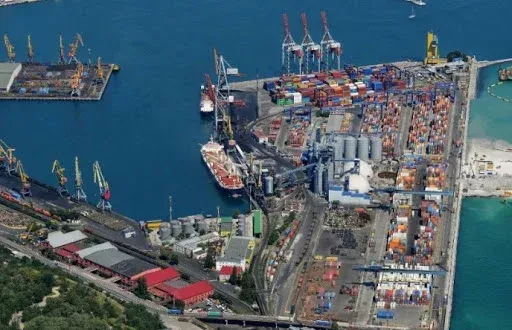The largest gate for “gray” grain exports: how the schemes work at the Olympex terminal
Kyiv • UNN
The Olimpex grain terminal is the largest gateway for gray grain exports from Ukraine. Exporters use schemes involving fictitious companies and cash payments to avoid taxes and currency controls.

The largest gateway for gray grain exports from Ukraine is the Olimpex grain terminal, one of the largest in Odesa region. "Gray" exporters use several export schemes - for cash and through fictitious companies. One of the most prominent examples of violators is the company of businessmen Serhiy Groza and Volodymyr Naumenko, Olympex Coupe International, UNN reports .
How the schemes work
One of the most common schemes of "gray" exports is the use of risky enterprises that are created in advance to export unaccounted for grain purchased for cash.
As practice shows, such companies are usually registered with front companies and do not engage in regular business activities. They either do not submit documents on the origin of grain or declare fake producers.
After the grain is exported from Ukraine, it is resold several times, after which it legally reaches the final buyer. At the same time, the currency does not return to Ukraine, which means that the budget does not receive additional revenues.
In such a scheme, the final buyer of grain is usually a non-resident company that pays money for grain to another non-resident company that is connected to the Ukrainian exporter.
Another option is possible, when currency is transferred to a non-resident, who then purchases goods abroad and imports them to Ukraine to sell them for cash and sell the tax credit.
According to analysts of the Bureau of Economic Security, last year risky enterprises exported grain of unknown origin for more than UAH 130 billion. At that time, it accounted for more than 20% of total grain exports.
At the same time, last year in Odesa region alone, 75 customs declarations totaling 1.6 million tons worth $430 million were denied customs clearance.
So it is not difficult to understand that the lion's share of "gray" grain exports came from grain terminals in Odesa region, namely from one of the largest, Olimpex. This, in particular, is confirmed by the materials of the criminal proceedings being investigated by the BES.

Groza and Naumenko followed a well-established pattern
According to the decision of the Pechersk District Court of Kyiv, which seized the property of Olympex Coupe International LLC, a part of the GNT Group of businessmen Serhiy Groza and Volodymyr Naumenko, during the pre-trial investigation law enforcement officers exposed a scheme to export agricultural products from Ukraine without paying taxes by using the details of companies with signs of "riskiness" during export operations.
According to the investigation, the actual delivery and cash payment were carried out at the production facilities, i.e. directly at the Olympex terminal controlled by Groza and Naumenko through the companies Olympex Coupe International and Attollo Granum.
"The integral property complexes at these addresses are used in illegal activities for storage, accumulation and transshipment of agricultural products of "risky" agricultural enterprises (business entities - ed.)," the court materials say.
The following "risky" companies were used for this purpose: "OUTSTAFF 19, EXPRESS ALL and AGROTRANS GROUP. With their help, more than 40 thousand tons of grains and oilseeds disappeared from the terminal in 2023.
During the searches at the grain terminal, law enforcement officers also found agricultural products without documents on the property owners. Thus, on November 10, 2023, about 22.6 thousand tons of wheat, almost 9 thousand tons of corn and 11 thousand tons of soybeans were stored at Olympex.

Add
In a commentary to UNN, the head of the Agrarian Union of Ukraine, Hennadiy Novikov, said that "gray" or "black" grain exports will existas long as payments are made in cash. At the same time, he said, the number of non-cash payments for agricultural products has recently increased.
"There is already a 50-50 split between cash and non-cash payments. Previously, non-cash payments were 3-5%, and if it was 10%, it was good, everything else was for cash. So the situation has improved, but not by 100%," he said.
According to Novikov, exporters should not be interested in "black" exports, because they will not receive VAT refunds and will lose competitiveness.
"It's another matter that they sell (products - ed.) to subsidiaries and withdraw capital, but this is a slightly different matter. This is not black exports, these are financial transactions, violations, etc.," he said.
Recall
A group of companies GNT Group, owned by businessmen Serhiy Groza and Volodymyr Naumenko, received investment loans from two American funds in 2019 and 2021 to develop the Olympex grain terminal in Odesa, which they owned at the time. These companies of Groza and Naumenko, according to media reports, actively cooperated with the company of Vadym Alperin, a sanctioned smuggler who was deprived of Ukrainian citizenship.
Deciding not to repay their creditors, Groza and Naumenko took out loans from Ukrainian banks Vostok and Pivdenny against the property of the grain terminal, which was already pledged to the Americans.
Through a simple scheme using controlled companies and Ukrainian banks, they resold the property of Olympex several times, trying to retain control over the terminal.
Ukrainian law enforcement agencies have opened several criminal cases in connection with the situation around Olympex. For example, one of Naumenko and Groza's companies was found to be involved in the "gray" export of grain stored at the terminal.
And creditors, in turn, are demanding the return of their funds in international arbitrations, and quite successfully. In particular, the English arbitration court ruled on the worldwide freezing of Groza and Naumenko's assets.
Read more about the conflict over the Olimpex grain terminal in this article: "Groza and Naumenko's company GNT Group blocked the work of the grain terminal in Odesa. Detailed chronology of the conflict."